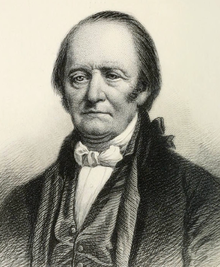Thomas Chittenden
| Thomas Chittenden | |
|---|---|

Official state portrait of Governor Thomas Chittenden
|
|
| 1st Governor of Vermont | |
|
In office October 1790 – August 25, 1797 |
|
| Lieutenant | Paul Brigham |
| Preceded by | Himself as Governor of the Vermont Republic |
| Succeeded by | Paul Brigham |
| 1st & 3rd Governor of the Vermont Republic | |
|
In office 1790 – March 4, 1791 |
|
| Lieutenant | Peter Olcott |
| Preceded by | Moses Robinson |
| Succeeded by | Himself as Governor of the State of Vermont |
|
In office 1778–1789 |
|
| Lieutenant | Joseph Marsh |
| Preceded by | None |
| Succeeded by | Moses Robinson |
| Personal details | |
| Born |
January 6, 1730 East Guilford, Colony of Connecticut, British America |
| Died | August 25, 1797 (aged 67) Williston, Vermont, U.S. |
| Political party | None |
| Children | Martin Chittenden |
| Profession | polictian |
| Signature | |
Thomas Chittenden (January 6, 1730 – August 25, 1797) was the first governor of the state of Vermont, serving from 1778 to 1789, when Vermont was a largely unrecognized independent state, called the Vermont Republic, and again after a year out of office, from 1790 until his death. During his first term after his return to office, Vermont was admitted to the Union as the 14th state.
Chittenden was born in East Guilford in the Colony of Connecticut on January 6, 1730. He married Elizabeth Meigs on October 4, 1749, in Salisbury, Connecticut. The couple had four sons and six daughters while they were living in Connecticut. All the children survived to adulthood. He was justice of the peace in Salisbury and a member of the Colonial Assembly from 1765 to 1769. He served in Connecticut's 14th Regiment from 1767 to 1773, rising to the rank of Colonel. He was descended from Thomas Chittenden (1635–1683), who was born in Cranbrook, Kent, England and settled in the Connecticut Colony.
Chittenden moved to the New Hampshire Grants, now Vermont, in 1774, where he was the first settler in the town of Williston. In 1777, a convention was held in Windsor, which drafted Vermont's first constitution, establishing Vermont as an independent republic. During the American Revolution, Chittenden was a member of a committee empowered to negotiate with the Continental Congress to allow Vermont to join the Union. The Congress deferred the matter in order to not antagonize the states of New York and New Hampshire, which had competing claims against Vermont. During the period of the Vermont Republic, Chittenden served as governor from 1778 to 1789 and 1790 to 1791, and was one of the participants in a series of delicate negotiations with British authorities in Quebec over the possibility of establishing Vermont as a British province.
...
Wikipedia
